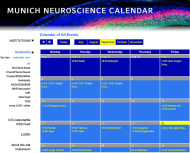Formation and development of the school

The GSN is a distinct institution of LMU Munich, governed by a Scientific Board and independently awarding a doctoral degree. Coordinating with a broad range of neuroscience fields makes the GSN, not only on a practical basis but also from a formal perspective, a truly interdisciplinary program.
The GSN was established in 2006 as an interdisciplinary institution of LMU Munich and a program of the German Excellence Initiative (formerly supported by Wissenschaftsrat and Deutsche Forschungsgemeinschaft, DFG). Only five years after its beginning, over 100 students were enrolled in both the master's and PhD programs, and the number continued to rise. Following the conclusion of the first funding period, the graduate school was re-evaluated in June 2011, yielding excellent statements from the scientific reviewers and the government of Bavaria.
Nowadays, on the eve of its 20th anniversary, the GSN is home to over 350 students and alma mater to another 550 alumni, and is affiliated with more than 170 faculty members. The GSN also demonstrates an increasing attractiveness to foreign students, with a 60% representation of internationals in the student body, above the initial goal of 50%.
 Building GSN-LMU: Mission and Impact
Building GSN-LMU: Mission and Impact
From the beginning, the GSN drove to become the hub for neuroscience education in Munich. In order to implement the standardization of European university education according to the Bologna consensus, the strong neuroscience community of the LMU immediately developed and implemented a doctoral program in neuroscience, which nowadays serves as an educational role model.
Under Prof. Benedikt Grothe’s visionary leadership, GSN evolved into a thriving, internationally recognized graduate school, committed to training the next generation of neuroscientists in a truly systemic way. Our programs’ curriculum weaves together molecular, cellular, systems, and behavioral neuroscience – emphasizing neuron–neuron interactions, circuit dynamics, and information processing across brain regions. Selected students receive intensive individual tutoring and the chance to study and research in an exciting scientific environment.
Parallel to founding the GSN, Prof. Grothe also co-founded the Munich Center for Neurosciences – Brain & Mind (MCN-LMU) and initiated the Master's program in Neurosciences, launched in the winter term of 2007 and originally supported by the Elite Network initiative of the Bavarian government.
A Legacy of Community and Mentorship
In his role as Spokesperson of GSN-LMU, Prof. Grothe was more than an administrator – he championed a culture of openness, intellectual rigor, and collaboration. Under his guidance, the graduate school has nurtured generations of neuroscientists, many of whom now lead their own labs, collaborate across Europe, and push the boundaries of systemic neuroscience.
Stepping into a New Role
In July 2025, Prof. Grothe was elected Vice President for Natural and Life Sciences & Deputy President of LMU, a testament to his institutional leadership and vision. In this new capacity, he is well-positioned to further strengthen LMU’s research framework, promote interdisciplinary exchange, and continue to support the future of neuroscience education.
Looking Ahead
As we honor Prof. Grothe’s foundational role in GSN-LMU, we also look to the future – a future built on the strong structures he helped establish. The school's newly elected Spokesperson, Prof. Laura Busse will work closely with students, faculty, and staff to further support the vibrant doctoral community, the high-quality research output, and the culture of inquiry and mentorship her predecessor fostered.





